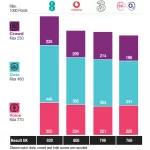OECD Calls on UK to Invest in Broadband or Risk COVID19 Scars

The Organisation for Economic Co-operation and Development has called on the UK to invest more into upgrading digital infrastructure (broadband and mobile) in order to help avoid the COVID-19 crisis, as well the risk of a no-deal Brexit, leaving a lasting scar on the country’s economic trajectory for years to come.
At present the Government is already preparing to invest £5bn in order to help spread “gigabit-capable” broadband across as much of the UK as possible by the end of 2025 (funding will be focused on the final 20% of hardest to reach homes and businesses). On top of that they’re also pumping another c.£500m to help improve 4G and 5G mobile coverage via the Shared Rural Network (SRN).
However, the OECD warns that the UK’s overall public investment has been “lower than in other leading economies in recent years“, and investment in digital infrastructure “still lags investment in transport, energy and utilities.” These are all areas where the country lags the best-performing OECD countries and which are “likely to bring high productivity gains.”
Advertisement
Planned spending to improve digital skills could, says the OECD, also be “more ambitious“, as the COVID-19 crisis makes the “low level of adult training” in the UK a more urgent concern.
Laurence Boone, OECD Chief Economist, said:
“The combination of COVID-19 and the exit from the EU Single Market makes the UK outlook exceptionally uncertain. Actions taken to address the pandemic and decisions made on future trading relationships will have a lasting impact on the UK’s economic trajectory for years to come, so they should be in line with long-term objectives.
Productivity growth in service sectors will have to accelerate significantly for the recovery to be long-lasting and sustainable.”
As it stands the OECD warns that the UK still faces a “prolonged period of disruption to economic activity“, which they say risks exacerbating pre-existing inequalities and regional disparities (most households have already reported a drop in income since the crisis).
The organisations survey, which assumes that a smooth transition to an EU Free Trade Agreement will occur, projects an “unprecedented fall” in GDP in 2020 of 10.1%, with activity still below its pre-crisis level by the end of 2021. The unemployment rate is projected to be 7.1% in 2021, up from 3.8% in 2019.

Advertisement
Mark is a professional technology writer, IT consultant and computer engineer from Dorset (England), he also founded ISPreview in 1999 and enjoys analysing the latest telecoms and broadband developments. Find me on X (Twitter), Mastodon, Facebook, BlueSky, Threads.net and Linkedin.
« Broadband Woes Interrupt Meeting of the Welsh Parliament























































UK has a problem of wanting to control what people see by removing the content people enjoy and inserting manipulative toxic influencer infested stuff that they control by telling those few people they pay what to say and how to manipulate.. It’s either that or we all collectively have a delusion about what is a real trend and what people actually enjoy and not get to be insane because of. Either way there’s always a downside when wanting more control of the web than actually admiting to. I don’t mind, I’ll always find a way to bypass actual manipulation to keep my sanity, however it requires weekly checks of all systems and networking to keep dodging that stuff.
Any 5G and broadband rollouts will take a while and unlikely to help ‘invest more into upgrading digital infrastructure (broadband and mobile) in order to help avoid the COVID-19 crisis, as well the risk of a no-deal Brexit’ This is probably the wrong interpretation of the report.
Given the current and near future availability of broadband the issue is getting people to use technology to their advantage.